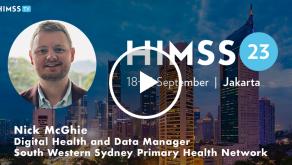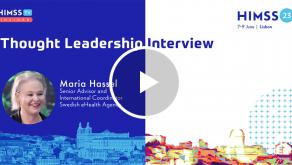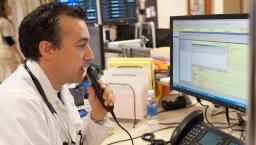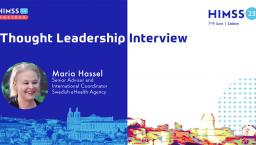Mount Sinai slashes 10-year IT capital costs by moving to the cloud

Photo: Mount Sinai Health System
Healthcare is rapidly changing due to a highly competitive market – not to mention evolving consumer expectations, differing care models, and the need for platforms to meet different clinical and research demands.
THE PROBLEM
Mount Sinai Health System needed to proactively prepare for and get ahead of these changes and future business and technology needs.
"We also were operating 13 data centers/server rooms across the health system, and sizeable investments and effort would have been needed to remediate data center issues," said Kristin Myers is executive vice president and chief digital and information officer at the Mount Sinai Health System and dean for digital and information technology at the Icahn School of Medicine at Mount Sinai.
The organization made the strategic decision to embark on its data center and cloud transformation journey to address these problems:
· Increased risk and impact to revenue, operations and patient care from data center outages.
· Significant investment and effort from remediating data center issues.
· Fragmented technology infrastructure that will be difficult to appropriately support new business, digital growth and innovation.
PROPOSAL
Microsoft Azure cloud technology, Myers explained, offered a modern technology platform and services to resolve the challenges Mount Sinai was facing. It would alleviate the issues, Myers said, by helping the health system:
-
Avoid tens of millions of dollars to complete facilities remediation and to hire additional data center staff.
-
Improve the ability to recover from outages by creating geographic diversity and failover capabilities in the cloud.
-
Reduce data center footprint with space reclamation across multiple health system locations.
-
Provide a balanced and scalable technology infrastructure with increased security, reduced hardware costs, improved uptime/recovery and increased agility.
-
Support innovation efforts through enabling new business growth models and supporting research and AI initiatives.
MEETING THE CHALLENGE
"We worked with Microsoft to move to a hybrid cloud/colocation approach to significantly reduce our on-premise data centers and aggressively migrate remaining workloads to the cloud and colocation," Myers explained. "We conducted a current state assessment and developed a comprehensive plan to move the majority of our applications to the cloud, including Epic.
"With this massive effort, we also engaged with Accenture as our third-party vendor to provide cloud managed services to help support the cloud migration and cloud operations," she continued. "To ensure the success of this initiative, we established a robust governance structure both internally within Mount Sinai and also externally with both Microsoft and Accenture."
"To ensure the success of this initiative, we established a robust governance structure both internally within Mount Sinai and also externally with both Microsoft and Accenture."
Kristin Myers, Mount Sinai Health System
This allowed Mount Sinai to collaborate, make data-driven decisions, address risks or issues quickly, and ultimately stay on track for the cloud journey, she added.
RESULTS
Before Mount Sinai embarked on its cloud journey, it developed a comprehensive plan and associated business case that outlined costs and ROI.
"In addition to avoiding a large investment in facilities, data center and disaster recovery remediation, we also have projected a significant decrease in the 10-year IT capital that would have been required," Myers reported. "We did need to invest capital for the first two years to implement this initiative, though we are on target for positive payback by the end of 2026.
"We also will look to reduce operating expenses by a few million per year beginning in 2024," she said. "As part of the plan and business case, we have also successfully migrated, consolidated and shut down the identified data centers and servers, achieving the cost savings and also remediating the risks associated with the data centers."
ADVICE FOR OTHERS
Rich Birhanzel is senior managing director and global health industry lead at Accenture, the firm Mount Sinai works with. He offers this advice to Myers' peers embarking on similar cloud journeys.
"We have entered a new phase of healthcare enabled by technology," he stated. "By moving electronic health records to the cloud, organizations can put secure, real-time insights in the hands of clinicians and patients. At the same time, the power of the cloud allows organizations to optimize costs and reduce risk.
"Organizations like Mount Sinai that use EHR and cloud technology will be able to integrate, secure and innovate across platforms to reimagine healthcare access, experience and outcomes," he added.
Accenture has seen significant interest in EHR cloud systems in the United States and Canada since the beginning of 2022, yet very few have completed migrations like Mount Sinai, Birhanzel noted.
"The adoption of EHR cloud requires leadership support with a cloud-first mindset, financial commitment, and a realistic timeline that allows the proper pace of migration and factors in the impact on people and processes," he said.
"For those who are considering moving EHR to the cloud, there are several things to take into consideration," he advised. "The journey starts with the modernization of the core technology. By leveraging advanced cloud technology, organizations can reduce costs and allow room for growth and innovation."
Security must be considered from the start, focusing on reducing the risk of cybersecurity attacks to keep patients safe, he said.
"With the right approach to cloud transformation," he concluded, "organizations can build the foundation for humanized healthcare in which people receive truly personalized healthcare experiences."
Follow Bill's HIT coverage on LinkedIn: Bill Siwicki
Email him: bsiwicki@himss.org
Healthcare IT News is a HIMSS Media publication.

























